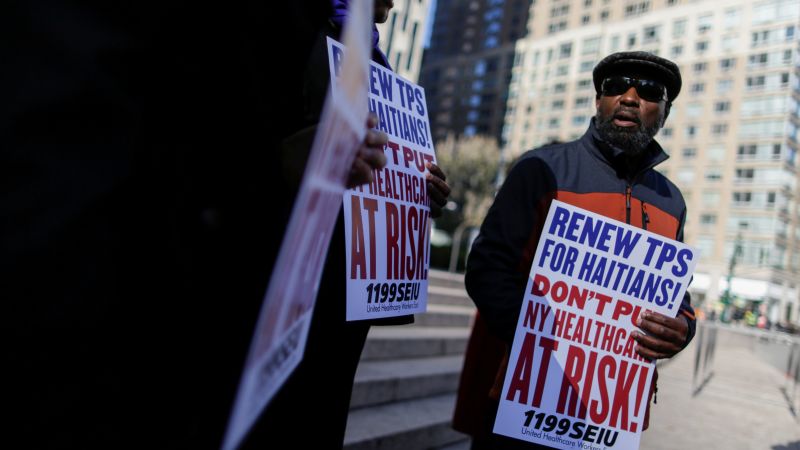A federal judge in Brooklyn has blocked the Trump administration’s attempt to prematurely end temporary protected status (TPS) for Haitian migrants. This decision, issued on Tuesday, asserts that the Department of Homeland Security (DHS) violated legal procedures in its efforts to revoke deportation protections and work permits from over half a million individuals.
The ruling follows DHS’s earlier action under Secretary Kristi Noem, which rescinded former President Joe Biden’s 18-month extension of Haiti’s TPS designation. Originally set to expire on February 3, 2026, the Trump administration aimed to shorten the designation, initially setting a new end date of August 3, then extending it to September 2. U.S. District Judge Brian Cogan determined that Secretary Noem did not adhere to the statutory requirements, including a mandatory review of current conditions in Haiti before terminating TPS.
Legal and Humanitarian Implications
Judge Cogan’s decision underscores the legal framework governing TPS. He stated, “Secretary Noem does not have statutory or inherent authority to partially vacate a country’s TPS designation,” adding that her actions were unlawful under the Administrative Procedure Act. The judge emphasized the urgency of the matter, noting that the plaintiffs’ injuries are “actual and imminent” and cannot be remedied by monetary damages.
The lawsuit, initiated in March by nine Haitian TPS holders and advocacy groups such as the Haitian Evangelical Clergy Association and Service Employees International Union 32BJ, argued that the abrupt policy change disrupted lives and forced families to prepare for deportation much earlier than anticipated. Judge Cogan, appointed by George W. Bush, indicated that the plaintiffs are likely to succeed on the merits of their case.
Background and Context
TPS is a humanitarian program that provides temporary legal status to nationals from countries experiencing armed conflict, natural disasters, or other extraordinary conditions. Haiti’s designation was initially granted following the devastating earthquake in 2010, which left the nation grappling with significant infrastructure damage and humanitarian needs.
The Trump administration’s stance on immigration has frequently involved efforts to curtail such protections, citing national security concerns and a desire to enforce stricter immigration policies. However, these moves have often faced legal challenges, with courts scrutinizing the adherence to procedural requirements and the humanitarian implications.
Expert Opinions and Future Outlook
Immigration experts have weighed in on the implications of Judge Cogan’s ruling. Maria Rodriguez, an immigration law professor at New York University, noted, “This decision highlights the importance of procedural compliance in immigration policy changes. It serves as a reminder that humanitarian considerations cannot be sidelined without due process.”
While the ruling temporarily secures the TPS designation for Haitian migrants until February 2026, it does not prevent DHS from terminating the status in the future, provided it follows statutory guidelines. A related case, Haitian Americans United Inc. v. Trump, is concurrently being heard in federal court in Massachusetts, presenting similar arguments against the administration’s actions.
Implications and Next Steps
The decision represents a significant legal setback for the Trump administration’s immigration agenda, emphasizing the judiciary’s role in checking executive actions. It also provides a reprieve for thousands of Haitian migrants who faced the threat of deportation.
As the case progresses, the focus will remain on the administration’s compliance with legal procedures and the broader implications for U.S. immigration policy. Observers anticipate further legal battles as advocacy groups continue to challenge policies perceived as undermining established humanitarian protections.
The outcome of these cases could set precedents for how temporary protected status is managed in the future, influencing both policy formulation and the lives of those who depend on such protections. The ruling not only offers temporary relief but also reinforces the necessity for transparent and lawful policy-making processes.
About The Author
 France’s Outdoor Smoking Ban Sparks Global Debate on Public Health Restrictions
France’s Outdoor Smoking Ban Sparks Global Debate on Public Health Restrictions Elon Musk’s Political Gambit Faces Trump’s GOP Stronghold
Elon Musk’s Political Gambit Faces Trump’s GOP Stronghold Elon Musk’s Political Engagements Threaten Tesla’s Stability
Elon Musk’s Political Engagements Threaten Tesla’s Stability Remembering Pauline Catherine Stanton: A Life of Dedication and Love
Remembering Pauline Catherine Stanton: A Life of Dedication and Love New World Map Reveals Marine Mollusks Shaped by Ancient Ocean Currents
New World Map Reveals Marine Mollusks Shaped by Ancient Ocean Currents